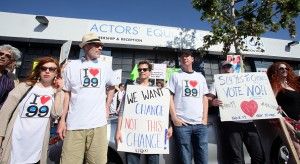Bill to increase CA minimum wage passes Senate
 On Tuesday, a bill to increase the state’s minimum wage was approved by the state Senate.
On Tuesday, a bill to increase the state’s minimum wage was approved by the state Senate.
Senate Bill 3, jointly authored by state Senator Mark Leno, D-San Francisco, and Senator Connie M. Leyva, D-Chino, would raise the minimum wage to $11 per hour in 2016 and $13 per hour in 2017. The bill also adds a requirement, starting in 2019, for automatic adjustment of the minimum wage based on the California Consumer Price Index. According to bill text, the minimum wage rule applies “to all industries, including public and private employment.”
“Despite our recovering economy, millions of Californians, many of them children, continue to live in poverty,” Sen. Leno wrote in a press release. “Full-time workers in this state should not be forced onto public assistance simply because they earn the minimum wage. It is time to lift up poor Californians and reward all hardworking employees with the resources they need to put food on the table for their families. Sub-poverty wages should not be legal in California.”
“California’s economic resurgence hasn’t changed the fact that we still have the highest poverty rate in the nation,” Senate President pro Tem Kevin de León, D-Los Angeles, principal co-author of SB3, also wrote in the release. “Senator Leno’s SB3 to raise the state’s minimum wage from $9 an hour to $13 by 2017 is a necessary first step in combating poverty in the swollen ranks of our state’s working poor.”
The release continued with several data points:
California has the highest poverty rate in the nation. The U.S. Census Bureau reports that nearly a quarter of the state’s 38 million residents live in poverty. An employee working full time earning $9 an hour brings home just $18,000 annually before taxes, which is just 75 percent of the federal poverty line for a family of four. As a result, many cities have taken the matter into their own hands, raising local minimum wages either by government action or at the ballot box. San Francisco has approved a minimum wage hike of $15, and Oakland has a $12.25 minimum wage. In addition, the Los Angeles City Council has approved a preliminary plan to pay its lowest-earning workers $15 an hour by 2020.
SB3 is “co-sponsored by the Western Center on Law and Poverty, United Food and Commercial Workers and the SEIU California State Council.” The bill also touts support from various other organizations, such as the Women’s Foundation of California, California Teachers Association, Children’s Defense Fund of California, California Association of Food Banks and California Catholic Conference of Bishops.
Sen. John Moorlach, R-Costa Mesa, opposed the minimum wage hike and made the following comments during the Senate floor debate:
“What kind of society are we running? It’s a capitalistic society. And we need to honor work. We need to honor the work of those that are creating the jobs; that are paying the taxes that allow us to subsidize the transportation and everything else. And it’s the risk takers, it’s the small business people that have to figure out and do the quantifying and analysis. And they sit down and say how much is it going to cost to do the job of running this small business. Whether they are a franchisee or starting their own professional business, they’ve got to sit down and say, ‘what am I going to have to pay for rent, and what am I paying for utilities, and what am I paying for all the other expenses, and then what am I paying for payroll, payroll taxes, unemployment insurance, workers comp, benefits, all the rest?'”
Sen. Moorlach added, “We have to be real careful. With a minimum wage increase, you’re attacking business people that are subsidizing this state and this nation. And, I encourage a no vote.”
The California Chamber of Commerce previously labeled SB3 as a “job killer” bill and said the mandate would “simply overwhelm many businesses that are already struggling with the current minimum wage increase and other cumulative costs imposed in California,” leading to limited job growth and a decline in jobs throughout the state. The automatic indexing of the minimum wage to inflation also adds uncertainty and burden to the business community “because it fails to take into consideration other economic factors or cumulative costs to which employers may be subjected.”
SB3 was approved on a 23-15 vote. The bill now goes to the state Assembly for consideration.
Related Articles
CalWatchdog Morning Read – May 2
Trump, eggs and the CAGOP convention Bay Area residents ready to leave Cruz changes tune in CA Condoms in porn =
Obama administration taps AP phone lines
May 14, 2013 By Katy Grimes The Associated Press found itself in an interesting juxtaposition yesterday when it had to
Chino Hills in the news again
April 23, 2012 By Katy Grimes Following up the many stories I’ve done on the Southern California Edison Tehachapi Transmission



